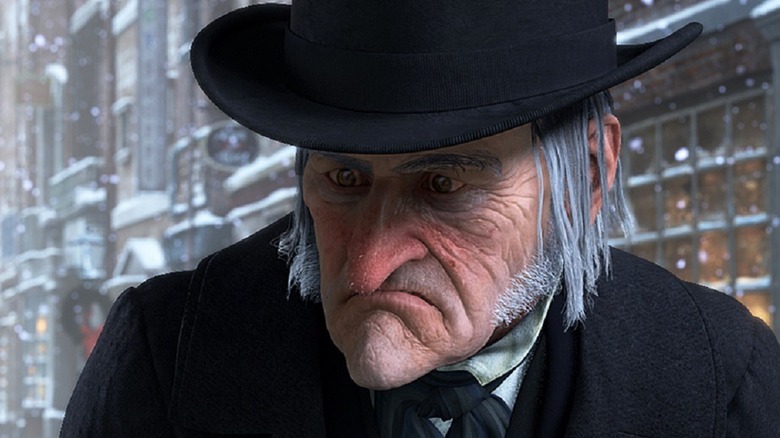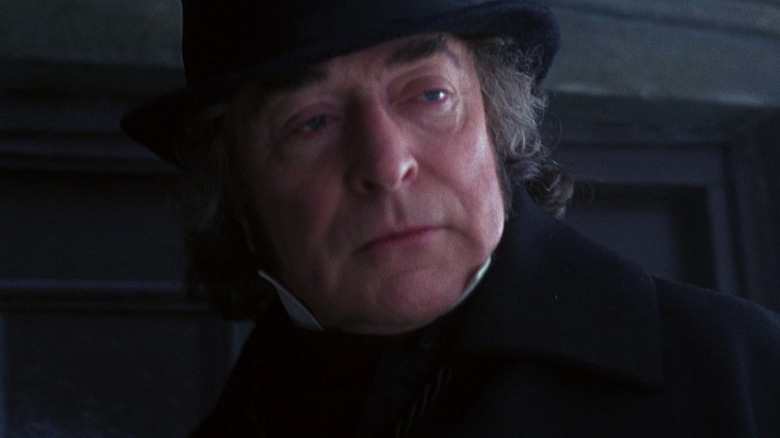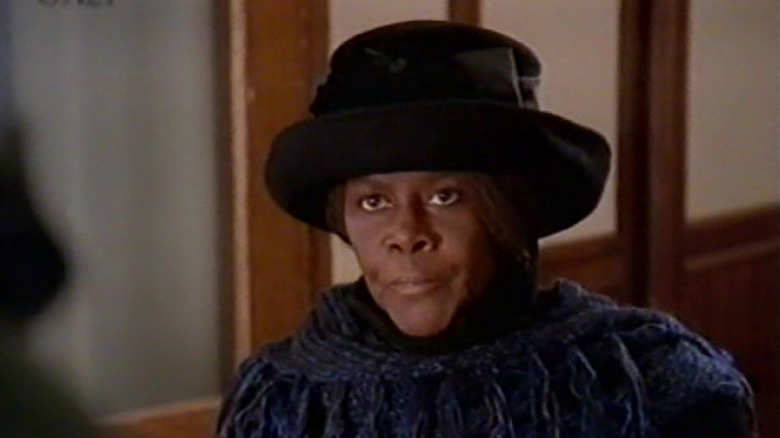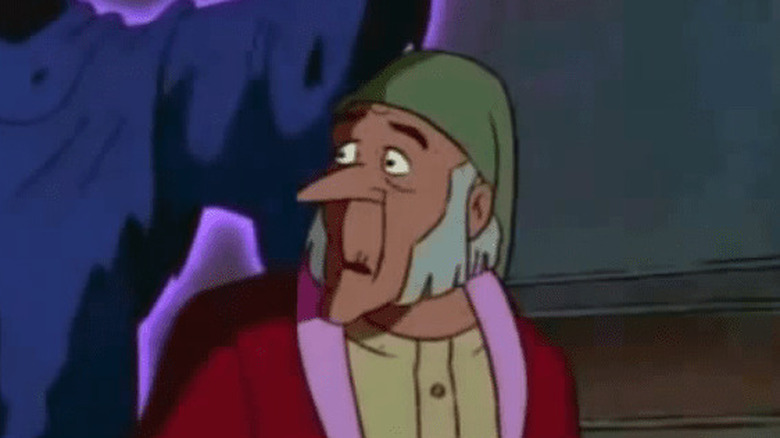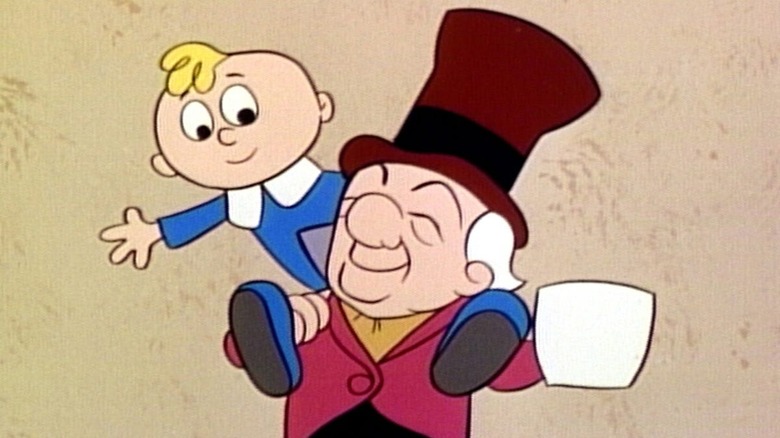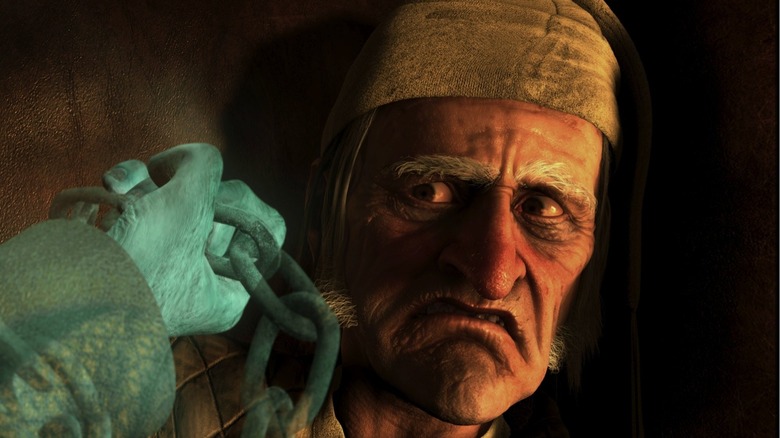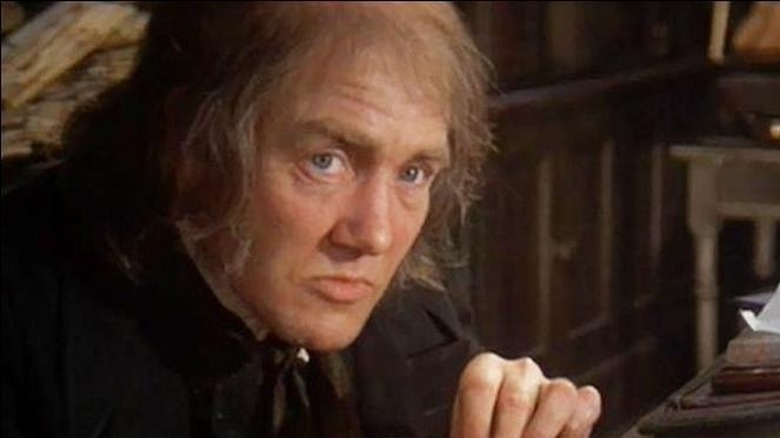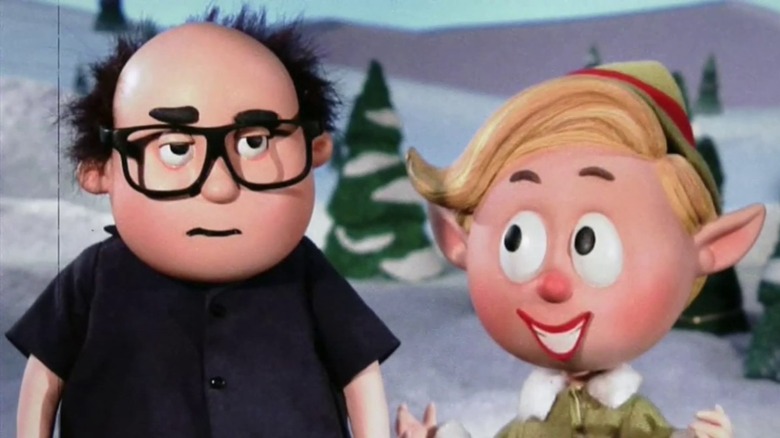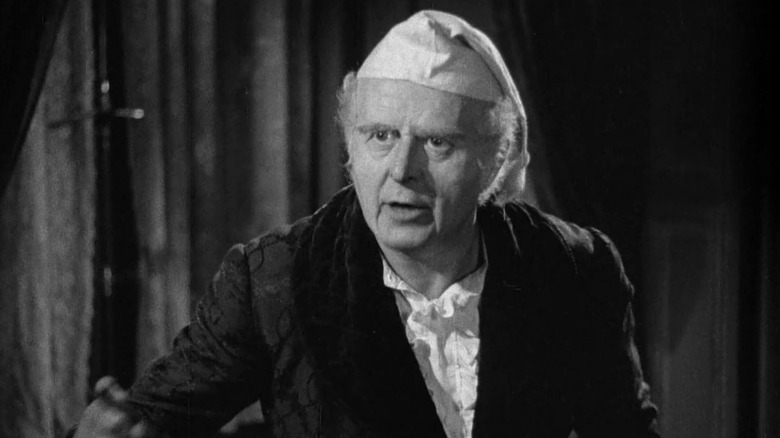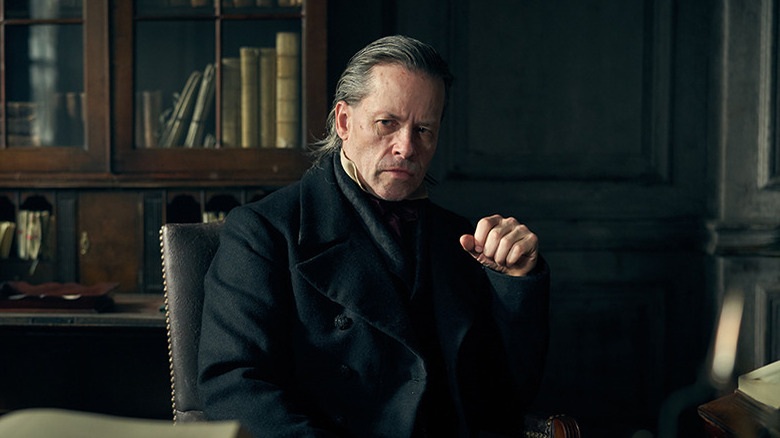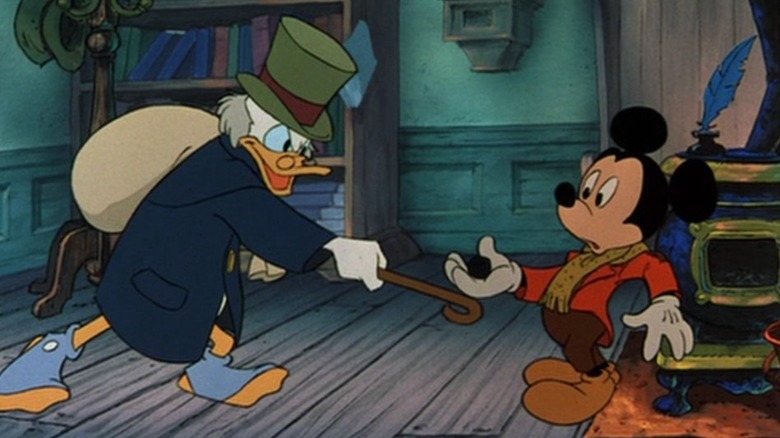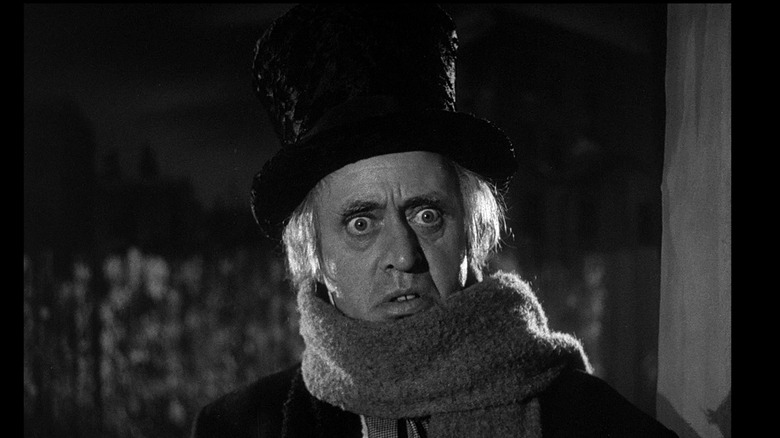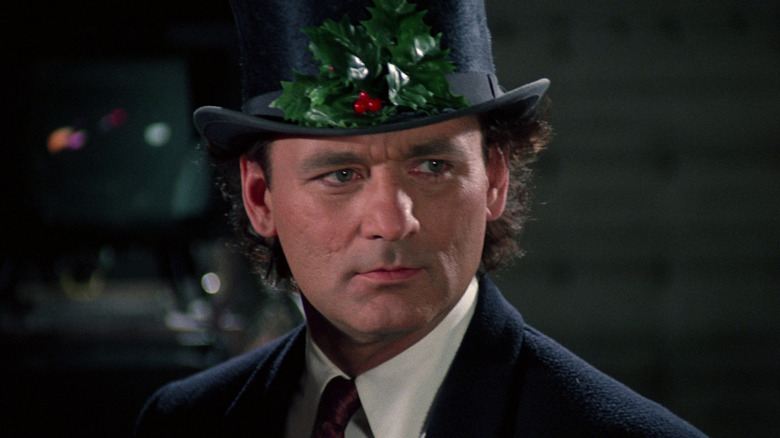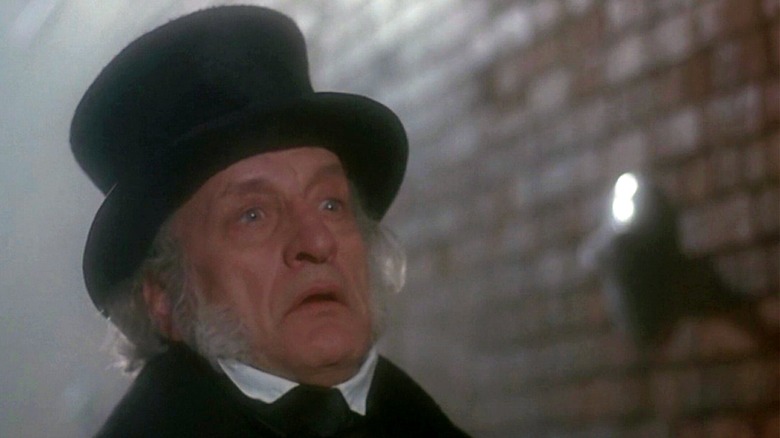Ebenezer Scrooge: The Best Movie And TV Versions Ranked
Charles Dickens is considered one of Britain's greatest writers, and while his novels like "A Tale of Two Cities," "Oliver Twist," and "Great Expectations" (to name just a few) are true literary masterpieces, arguably no story has had wider reach or greater impact than "A Christmas Carol." It seems like a new adaptation comes out every year, not including the countless TV shows that have a "Christmas Carol"-themed episode.
Along those lines, Ebenezer Scrooge has got to be the most recognizable Christmas character after Santa Claus, and his redemption story is perfect in its simplicity. A rich old miser is visited by four ghosts showing how a few poor steps from his past have led to a rotten present and a tragic future. In the process he regains his humanity, saved in greatest part by a disabled little boy. If a saved Scrooge, filled with joy as he runs around bestowing gifts on his community and especially his overworked, underpaid employee Bob Cratchit doesn't inspire a welling in your throat you might be a Scrooge yourself.
While there are many adaptations, not all hit. Sometimes it's the production itself; more often than not, though, the actor who plays Scrooge will determine whether it's a timeless classic or just another run-through of a man and his ghostly visitors, changed by the fate of a smart but sickly child. Here's the list of the best portrayals of everybody's favorite reformed tightwad.
Michael Caine, A Muppet Christmas Carol
Sir Michael Caine is a living legend. This production, though, is obviously driven by the Muppets surrounding him to the point where he gets a bit overshadowed. Yet his performance is made impressive by his ability to emote so well across from a bunch of felt-covered hands and machines, and to keep us focused on this man's story while their wild comedy is permeating every corner.
Obviously, the British actor can do "happy" extremely well so the salvation scene at the end is simply fantastic. Yet watching Michael Caine play the mean Scrooge is out of character for a man so well known for his many affable roles that it's pretty fun itself. Plus his ability to play a straight man with all the zaniness around him really drives the story home. As he explained in an interview, "I am playing Scrooge kind of differently from the way he's been played before, but very, very seriously. I mean, when he cries, he cries. There are no concessions made to the fact that it's a film for children or I'm with the Muppets." Still, he ranks low on the list because this portrayal is not one of the all-time classics, nor does it present something new for the Scrooge character.
Cicely Tyson, Ms. Scrooge
Scrooge is pretty much always an old white man, except in Hallmark's "Ms. Scrooge" when Scrooge is an old Black woman named Ebenita Scrooge, played by the celebrated actor Cicely Tyson. Her former partner is a woman named Maude Marley, played by the inimitable Katherine Helmond, another big departure from the traditional story. Otherwise, it follows the standard tale, though with a strong racial component. Scrooge's dad opened a small business, one of the first Black-owned businesses in the area, but went on to die after it burnt down. Scrooge's struggle as a young Black woman without money helps explain her careful sense of money.
While this new twist on the old story makes it worth watching, it should be noted that Tyson is not at the peak of her acting skills in "Ms. Scrooge." It is a Hallmark film, though, and while Hallmark films are always great and entertaining, they're not noted for Oscar-worthy performances. Her prodigious talent does show through as she watches the horrors from her past, and she truly shines in her salvation scene.
Tim Curry, A Christmas Carol (1997)
There are a lot of great animated versions of "A Christmas Carol" but Dic's 1997 edition is near the top of the list. The animation is beautiful and the addition of a disgruntled dog as Ebenezer Scrooge's companion combines with all the musical numbers for an entertaining family film. The voice cast also includes Whoopi Goldberg, Ed Asner, and Michael York but it's Tim Curry's job voicing Scrooge that really makes it worth the price of admission.
Curry brings a gristly gravitas to the role since, let's be honest, Tim Curry is worth watching in anything (or in this case, worth listening to). His distinctive deep, singsong voice also sneaks in from time to time, adding a certain outrageous quality that is perfect for the over-the-top miser. It really drives home his exuberance as Scrooge sings about changing his tune. For a modern musical extravaganza sure to capture the attention of the kids, this is a Scrooge worth checking out.
Jim Backus, Mister Magoo's Christmas Carol
There have been a lot of TV characters who become Ebenezer Scrooge for a turn, but few are as memorable or absurd as Mister Magoo. To start, there are probably a lot of younger people who don't even know who Mister Magoo is. Mister Magoo is an old man who can't see and most of the show's gags revolve around his near-blindness. Instead of creating some sort of multiverse where Magoo is actually Ebenezer Scrooge, in this cartoon he plays the role of Scrooge in a stage production.
Magoo, of course, shows up late because he can't see, and the play ends when he accidentally drops lights on the director. For pure, silly comedy there are few Scrooges who could compete with Magoo, to the point that "The Simpsons" features a show within the show called "Mr. McGrew's Christmas Carol" in its episode "Tis the 15th Season." Mister Magoo playing Scrooge is truly a bizarre and wonderful portrayal of the old man.
Jim Carrey, A Christmas Carol (2009)
This is another voice actor portraying Scrooge, though with Zemeckis' performance-capture technology Jim Carrey creates more than just a voice — this technology also captures his amazing gestures and features. Perhaps this film works so well because Carrey is so cartoonish that his features are perfect as Scrooge's, and his distinctive voice makes the cartoon even more realistic.
This Scrooge may look most like the stereotype of an old British skinflint that Dickens was probably imagining. Jim Carrey delivers an outrageous performance as the tight-fisted, pointy-jawed old coot, a performance that really only Zemeckis' motion capture animation can do justice to. His untrusting Scrooge is truly a vision to behold. Of all the cartoon versions of "A Christmas Carol," this one may be the most compelling but then again, this is actually about halfway between a cartoon and a live action film. He grumbles, he cries, and he expounds in a way no other non-live-action film does.
Plus, Jim Carrey is fantastic as a Christmas curmudgeon — just check out "The Grinch" if you need more proof.
Albert Finney, Scrooge (1970)
This 1970 version of "A Christmas Carol," a boisterous musical following the successful musical adaptation of another Dickens novel, "Oliver," ended up getting its share of award nods. Albert Finney won a Golden Globe for Best Actor in a Musical or Comedy for his performance, making it one of the few award-winning adaptations of the Christmas standard.
The film was probably helped by the fact that Alec Guinness plays guide Obi-Wan Kenobi, I mean Jacob Marley. Finney's performance, though, is truly inspiring. Despite being a middle-aged man, he plays the old curmudgeon to perfection. At times, between the combover and the jowls, he looks strikingly like a former American president, which alone makes the film worth a gander. While it's a musical, Finney also manages to deliver the songs without making it seem like a silly holiday special; he snarls and sneers as he sings about how he hates people.
This film and performance exist in an interesting period, when the big-budget Hollywood musical was on its way out while the grittier, realist cinema of the 70s was on its way in. At times the musical numbers go quite over the top, but then again, that was the style. Just sit back with your favorite musical theater fan, toast the holiday cheer, and dive into the extravagance of a classic story and a bygone cinematic era.
Danny Devito, A Very Sunny Christmas
Yes, there are a ton of TV shows that retell "A Christmas Carol" in one way or another but they all center on the spirits showing them something from the past or the future that makes them stop being such a grouch. When The Gang from "It's Always Sunny in Philadelphia" recreate the classic as a driving storyline in their "A Very Sunny Christmas" two-parter, the new take on the old tale delivers one of the funniest moments of one of the funniest series out there.
Frank Reynolds has forever ruined Christmas for his children Dee and Dennis. He claims he's trying to show them you get nothing for free, and does so by buying himself the gifts they want. The joy he gets out of his stinginess, his reactions to the various "stages" (he tries to attack his former partner they claim is a ghost, he hides in a couch to spy on Christmas present, and in a classic stop-motion animation Christmas dream he sees a future where the Gang will kill him in a horrible way for being as bad as he is) makes this arguably the greatest take on Scrooge ever.
Frank is never fully redeemed, which is the point. He simply does the right thing because he's afraid of a horrible death. The irony is that once he finds his redemption, they quickly get robbed and brought back to their classic cynicism.
Reginald Owen, A Christmas Carol (1938)
The first two feature-length versions of "A Christmas Carol" came out within 3 years of each other. The 1935 version, "Scrooge," starred Seymour Hicks, who had previously played Ebenezer in a 1913 silent short version of the story. Hicks has the look of the old dastardly villains who were all the rage in the silent era, and at times he appears more like a homeless man than a rich miser. Reginald Owen, though, plays Scrooge in 1938's "A Christmas Carol" and his performance is a look into the future of cinema and specifically portrayals of Scrooge. He's a large, colorful cynic. He appreciates his life, even if he is lonely.
Most importantly, Owen's Scrooge looks like a real rich man, one who could share the wealth. His expressions feel more real, and his journey proceeds with the subtlety you would expect in a tale of redemption. This doesn't have the romantic backstory, but brings Fred into the game much more deeply, with Scrooge making him a partner and giving Cratchit a sizeable raise. This version of Scrooge sets the tone that most subsequent portrayals build on.
He's eloquent and gentlemanly; he appreciates Tim and you can feel a truly human journey toward that eventual redemption.
Guy Pearce, A Christmas Carol (2019)
FX's miniseries "A Christmas Carol" is the gothic retelling of "A Christmas Carol" we didn't know we needed. Think of the darkest version of the tale, then multiply it by 10 and add in some cynical logic and you'll have Guy Pearce's turn as Ebenezer Scrooge.
To start off, this isn't for the squeamish. There are new plot points centered on molestation, sexual degradation, alcoholism, and abuse. Even the jolly spirits are now very cynical. Yet Guy Pearce's Scrooge is a new and fresh portrayal that best explains why the old man lives and thinks the way he does. He makes decent points about the lack of nobility inherent in the human condition, such as wondering aloud if people can be good one day a year, why can't they just do so all the time?
Scrooge isn't some over-the-top old crank; he's a slave to logic and cynicism, a result of a childhood full of horrors and a mathematical mind. This all feels more real, and for that reason, it may be the most polarizing version. All the rest seem like parables by comparison, cartoonish stories that live in the extremes. This is the most relatable Scrooge, which makes him all the more frightening. Pearce's Scrooge is the central piece to the most unique retelling of the old story on this list.
Alan Young, Mickey's Christmas Carol
Scrooge McDuck is a perfect fit for Ebenezer since the rich old money-grubbing drake is named after the famous literary character. This animated version of "A Christmas Carol" is still distinctive, and this Scrooge is a far cry from so many others — not just because he's a duck without pants, either.
This Scrooge isn't frightened by the spirits, and his willingness to wisecrack with them is frankly refreshing. The many familiar Disney familiar faces playing each role have made this one a family favorite for decades. Plus, of all the cartoons, this one feels the most polished and is the easiest to watch and re-watch.
Just like nearly every other one of Scrooge's interactions, the redemption scene is equal parts hilarious and heart-warming. Especially when he shows up at the Cratchits pretending to be angry, struggling to hold in his newfound outlook on the world. Somehow the way Scrooge McDuck tells Bob Cratchit that he's giving him a raise and wants him to be his partner is one of the most heartwarming reveals across all the "Christmas Carol" movies, and his vision of Cratchit (played by Mickey Mouse) crying at Tiny Tim's grave not only explains Scrooge's change the best, but it will probably make you cry, too.
Alistair Sim, A Christmas Carol (1951)
This telling is point for point accurate to the book and there are no fancy contrivances or twists to make it different. Still, it's possibly the most compelling of the standard "A Christmas Carol" adaptations. Sim has such an emotive face that you can't help but be drawn in, even during the scenes where he's playing it a bit heavy. His eternal sneer is truly a thing of beauty and fright.
Sim's joy upon his second chance doesn't feel too overdone, and this film is considered by many to be the best "Christmas Carol" adaptation — for good reason. We see it all here, Scrooge's journey from young man to old, his business acumen and ruthlessness, his disbelieving journey to redemption, and finally his great joy set the pattern for subsequent high-brow performances. Even his final scene, telling Cratcxhit to get another lump of coal in the office, is repeated in other winning performances.
He shows true fear, drops to his knees begging for forgiveness, and giggles like a schoolkid. If it wasn't for Alastair Sim's Scrooge, we may not have the Ebenezer we all know, despise, and love today.
Bill Murray, Scrooged
Let's start with the obvious issues with this performance ranking towards the top: Bill Murray plays Frank Cross, not Ebenezer Scrooge (though he is putting together a "Christmas Carol" live performance). Lew Hayward is the Jacob Marley character; Eliot Loudermilk is a main character with no real analog in the source material. Frank Cross is a TV exec, not a banker. These differences are what make "Scrooged" so remarkable. It takes standard plot points and applies them to a totally different, yet recognizably-Scrooge story in the modern era. And Bill Murray brings it home.
His Frank Cross is every bit the hardnosed taskmaster, tight with money and cynical towards the world and everybody around him. As he gets visited, we can feel his transformation, and of course, the renewed chance at love makes this ending possibly one of the best. The real magic though is all Bill Murray. He's funny, at times with some real gallows humor. Murray nails his descent into madness as he begins getting visited by ghosts in modern Manhattan. When it comes time for him to show his heart and its changes, it's conducted with the tenderness Murray famously brings to most of his roles.
It isn't uncommon to hear somebody say "Scrooged" is their favorite retelling of "A Christmas Carol." While there is something to be said for a faithful retelling of an old masterpiece, to recreate it into a modern classic is something much easier said than done.
George C. Scott, A Christmas Carol (1984)
While George C. Scott has had an amazing career, there are probably plenty of younger people out there who only know him as the hardest of taskmasters, Ebenezer Scrooge, in 1984's "A Christmas Carol." George C. Scott doesn't go all madman running through the streets in his redemption, and that's rather refreshing. If you had a grandfather (or great-grandfather) who fought in WWII and then found redemption after living an embittered life, this is how he'd behave, with the joyful decorum of a man who has done some great things (he did play the lead in "Patton" after all).
Scott's solemnity throughout, especially as he begins to see his sins from the past and especially for the present and future feels more accurate than the blubbering, bawling, and shrieking Scrooges. In fact, Scott delivers a masterful performance defined by its discipline and in doing so makes his transition a more realistic march toward his final self-reflection and tight-lipped acceptance of his horrible behavior.
Truly there are few more memorable or palatable performances of Ebenezer Scrooge. It is simply perfect in its realistic subtlety, presenting a storyline-accurate Scrooge as one both understandable to the modern era and yet not at all departed from Dicken's original version.
God bless us, every one.
